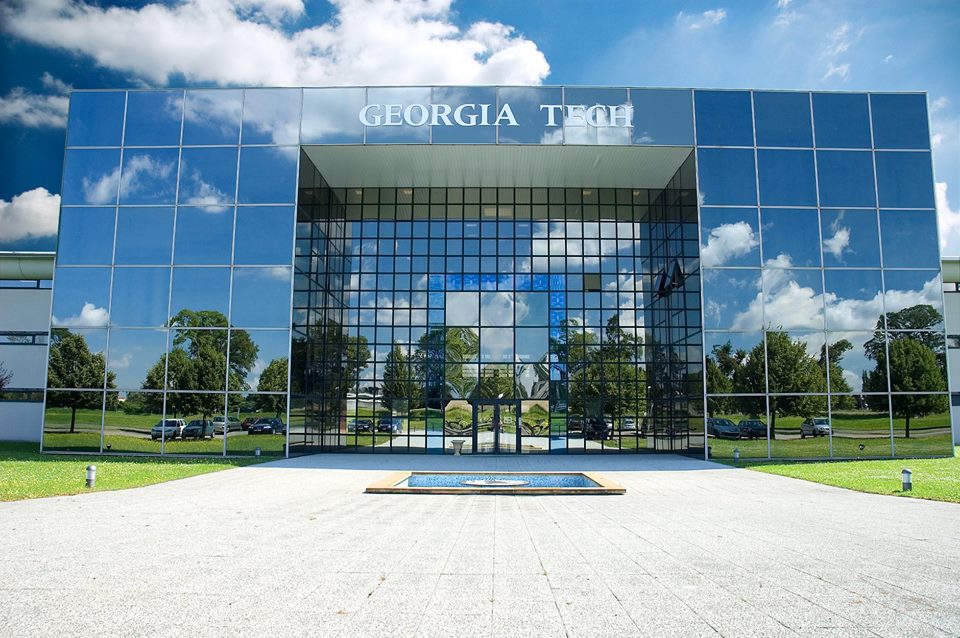
For over 30 years, Georgia Tech-Lorraine has led the European presence in Georgia Tech’s commitment to academics, research, and innovation. Now, the campus joins an extensive network of universities and industry partners throughout Europe with that same commitment.
For over 30 years, Georgia Tech-Europe has led the European presence in Georgia Tech’s commitment to academics, research, and innovation. Now, the campus joins an extensive network of universities and industry partners throughout Europe with that same commitment.
Georgia Tech-Europe, located in Metz, France, was recently officially announced as the newest full partner of The European University of Brain and Technology, also known as NeurotechEU. As the ninth founding partner of NeurotechEU, Georgia Tech-Lorraine joins eight elite universities throughout Europe including the University of Oxford and the Karolinska Institutet (Karolinska Institute). Combined with over 250 industry partners, the NeurotechEU mission aptly states that it is creating “a trans-European network of excellence in brain research and technologies to increase the competitiveness of European education, research, economy, and society.”
A Neuroscience Network
Officially established in January of 2020, NeurotechEU is the product of the European Universities Initiative funded by the European Commission, and is the first neuroscience- and fifth engineering-focused European university system of its kind.
“European universities go beyond the boundaries of universities and countries to bring universities around Europe together for research, education, and innovation,” explains Tansu Celikel, chair of NeurotechEU’s Board of Governors and the new chair of the School of Psychology at Georgia Tech.
Aiming to enhance the competitiveness and the quality of European higher education, this initiative provides funding to create networks of universities throughout Europe that come together to address major societal challenges through collaborative research and education. In addition to joining a vast network of committed partners, Georgia Tech-Lorraine will have access to this funding from the European Universities initiative as a founding partner of NeurotechEU.
Celikel says he is pleased to add Georgia Tech-Europe’s technical knowledge to the European University’s network. “The university is called The European University of Brain Science and Technology, but there were no partnerships with technical universities before Georgia Tech-Europe,” he notes. “Georgia Tech-Europe is bringing the technical expertise that is currently lacking.”
One aspect of Georgia Tech-Europe’s technical expertise that Celikel highlights is the Lafayette Institute, an extension of Georgia Tech’s “Innovation Ecosystem” dedicated to the innovation and commercialization of optoelectronics technology. “They have the equipment, facilities, and infrastructure to contribute uniquely to developing new technologies. By bringing together engineers with researchers and medical professionals under the NeurotechEU umbrella, this partnership is poised to advance the state of art in medical technologies.”
Georgia Tech-Europe also houses Georgia Tech – CNRS IRL 2958, an international research laboratory formed between Georgia Tech and the French Centre National de la Recherche Scientifique (CNRS) with research focused on nine areas of expertise, from smart materials and secure networks research to aerospace and robotics. As a powerhouse of technology research and development, Georgia Tech-Lorraine is poised to make meaningful contributions to NeurotechEU’s goal of advancing education, research, and innovation in neuroscience and neurotechnology.
Opportunities Abound
As partners to NeurotechEU, students and researchers at Georgia Tech-Europe will work together with top universities and businesses for course work, collaborative research projects, and internships in industry.
Georgia Tech-Europe president Abdallah Ougazzaden is especially thrilled about new opportunities for students not only to receive training in neuroscience, but to create research projects with academic and industry partners throughout Europe. “It’s very important that we are going to give [our students] the opportunity to have some training and research activities with some leading universities in Europe in this field,” he says. “We are going to learn from each other to develop new programs for our students.”
Students will also have the unique opportunity to go beyond Georgia Tech-Lorraine’s borders. “We are developing joint educational programs” Celikel points out. “Students will be able to tailor their curriculum both during their university education and afterward as NeurotechEU continues to develop training programs for life-long learners.”
Celikel is particularly excited about the prospect of bridging the Atlantic gap. “Georgia Tech-Europe is Georgia Tech,” he says. “This partnership brings Europe and the United States together around key research questions. Georgia Tech-Lorraine will be the key to realizing the full potential of this partnership.”
Alongside the new agreement, Ougazzaden adds that new programs, research projects, and more are also underway. “It’s just the beginning, especially for our students,” he adds. “We will be very proud that we can contribute to this field that is also related to challenges for our society. It’s very important. All the problems related to the brain — that’s something that we’re proud to be involved in.”
